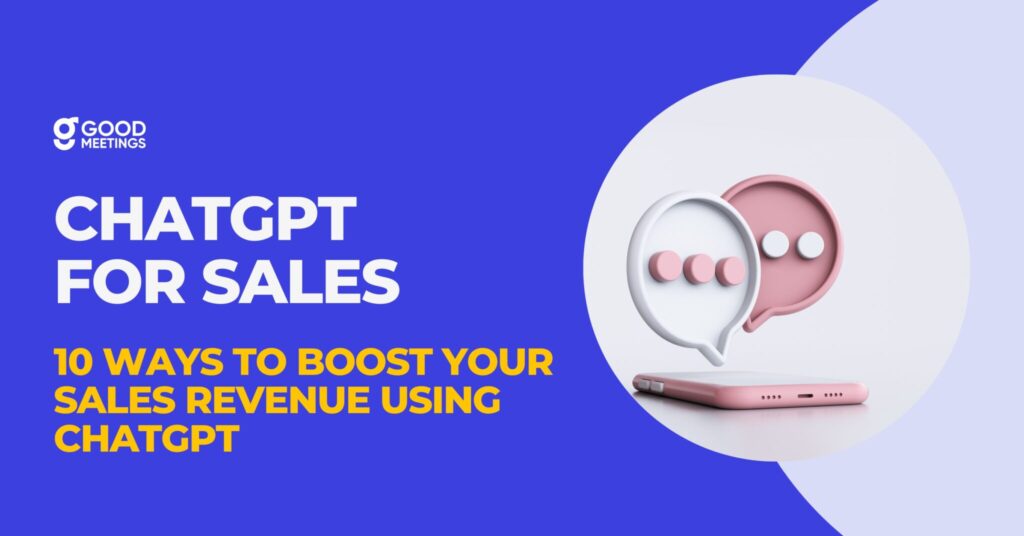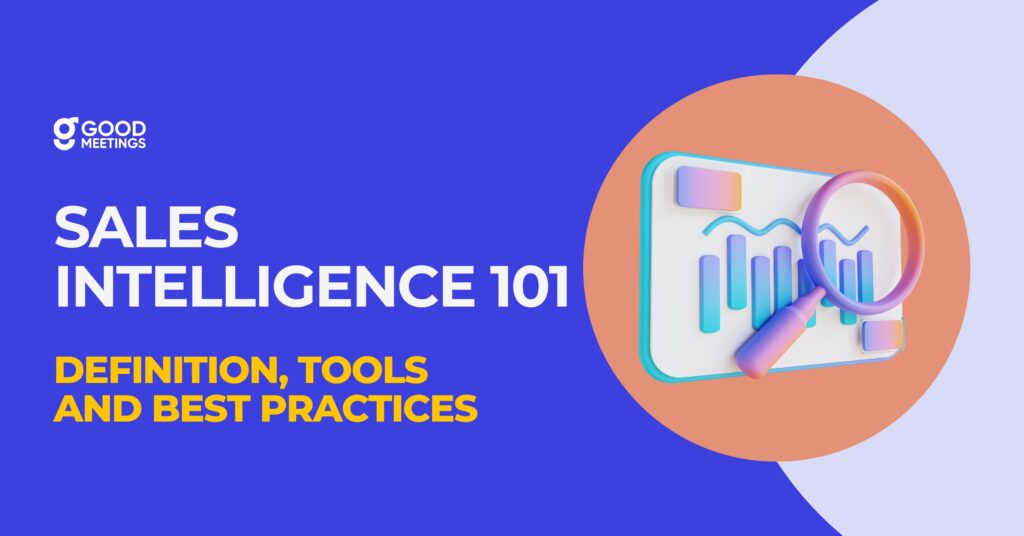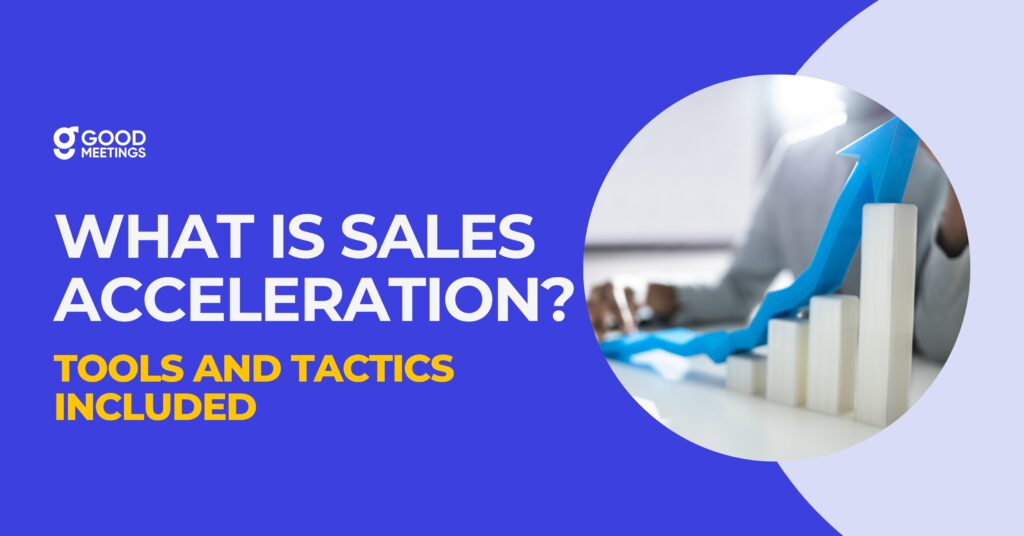Table of contents
- What is Sales Intelligence?
- Why is Sales Intelligence Important?
- Sales Intelligence Data Sources
- Role of AI in Sales Intelligence
- Best Sales Intelligence Software
Have you ever wondered how top sales teams consistently hit their targets? The answer lies in sales intelligence.
It involves collecting and analyzing data about prospects and customers to improve sales strategies and performance.
Did you know? 65% of organizations have already started using sales intelligence software to gain valuable customer insights and boost their sales performance.
If you want to stay competitive and improve your sales approach, it is important to understand the concept of sales intelligence.
This guide will introduce you to the basics of sales intelligence, including its definition, key tools, and best practices.
What is Sales Intelligence?
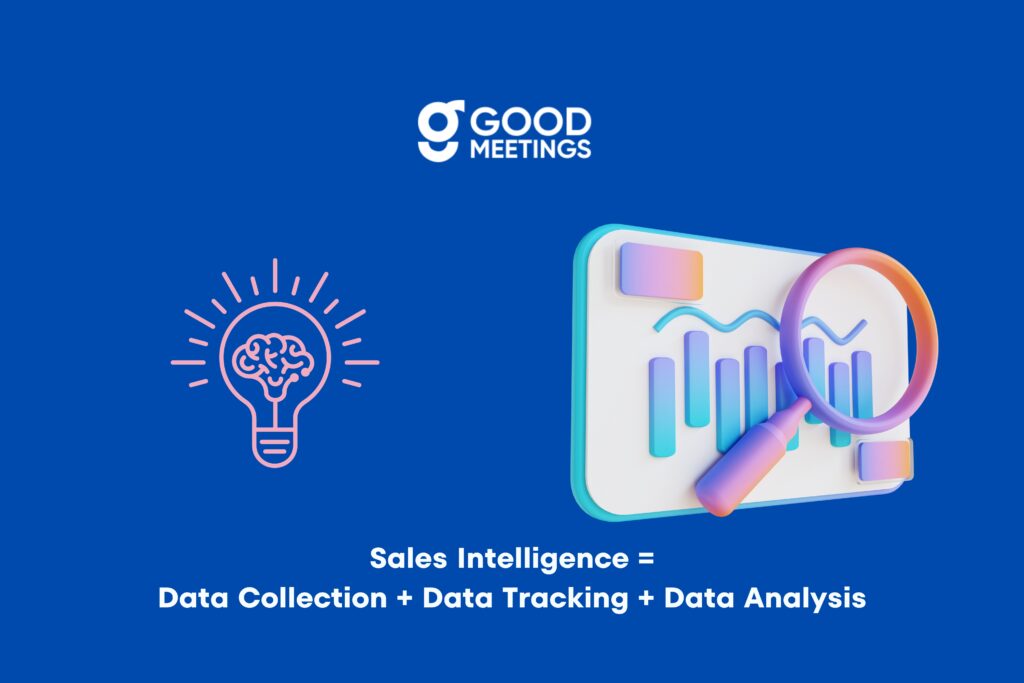
Source: Goodmeetings
Here’s a simple sales intelligence definition by Gartner:
Sales intelligence is the informatio/n that salespeople use to make informed decisions in the selling cycle. It includes the tools, techniques and practices that facilitate data collection, tracking and analysis. Sales intelligence provides data insights into customer prospects and leads.
Now let’s understand what it means in simple terms.
Sales intelligence refers to the process of gathering, analyzing, and using data to provide insights into sales and marketing activities.
It involves collecting data from various sources, such as customer interactions, market trends, social media, and competitor analysis, and then using this information to make informed decisions and improve sales strategies.
Related: 10 Best Sales Intelligence Software For 2024
Why is Sales Intelligence Important?
With sales intelligence, you can learn about:
- What competitors are doing
- How the market is doing
- New opportunities to grow
As a result:
- Your sales team can sell more, faster
- Decisions are easier with data to back them
But that’s not all! There are many other benefits of using sales intelligence. Here are a few of them:
1. Finding Your Ideal Customers
With sales data and intelligence, it’s easier to find the people most likely to buy from you. You can create profiles of your best customers and then find others who are similar. This makes finding new customers faster, so you spend less time chasing leads that won’t go anywhere.
2. Visualize Your Data
Sales intelligence solutions often come with features like integrating with your customer records, managing leads, and showing data in easy-to-understand ways, like charts or graphs. This helps your sales team track how they’re doing, understand who they’re selling to, and make better choices.
3. Spotting the Best Opportunities
Sales intelligence uses predictive analytics to identify which leads are most likely to convert into customers. It looks at things like what they bought before, how they interact with your website or emails, and who they are. This helps you focus on leads that are more likely to buy, so your sales team doesn’t waste time on ones that won’t.
4. Keeping Your Records Clean
Sales intelligence solutions help you maintain accurate and up-to-date customer data by automatically updating information and removing duplicates or outdated records. This means your sales team can trust the information they have, so they don’t waste time on the wrong leads.
5. Making Sales Faster
With sales intelligence, your sales team can access valuable insights about potential customers, including their needs, pain points, and buying preferences. Armed with this information, they can tailor their sales pitches and communication strategies to resonate with each prospect, leading to quicker and more successful sales interactions.
6. Improving Your Products
Sales intelligence provides valuable insights into customer feedback, preferences, and market trends, allowing you to identify areas for improvement in your products or services. With this information, you can make your products better. This keeps customers happy and coming back for more.
7. Creating Better Marketing
By analyzing customer data and behavior patterns, sales intelligence enables you to create highly targeted and personalized marketing campaigns. You can split your customers into groups based on different things, like how old they are or what they buy, and send them ads that match what they like. This makes your marketing campaigns work better and brings in more customers.
8. Save Time with Automation
Sales intelligence can handle tasks such as generating reports and analyzing data, freeing up your sales team’s time to focus on their strengths: selling and closing deals. By automating these tasks, your team can work more efficiently, accomplishing more in less time.
Related: 15 Best Sales Automation Tools to Boost Your Revenue in 2024
Sales Intelligence Data Sources
Sales intelligence gathers information from many places to help businesses make smart sales decisions. Recent studies show that companies use data from both inside and outside sources to understand their markets better.
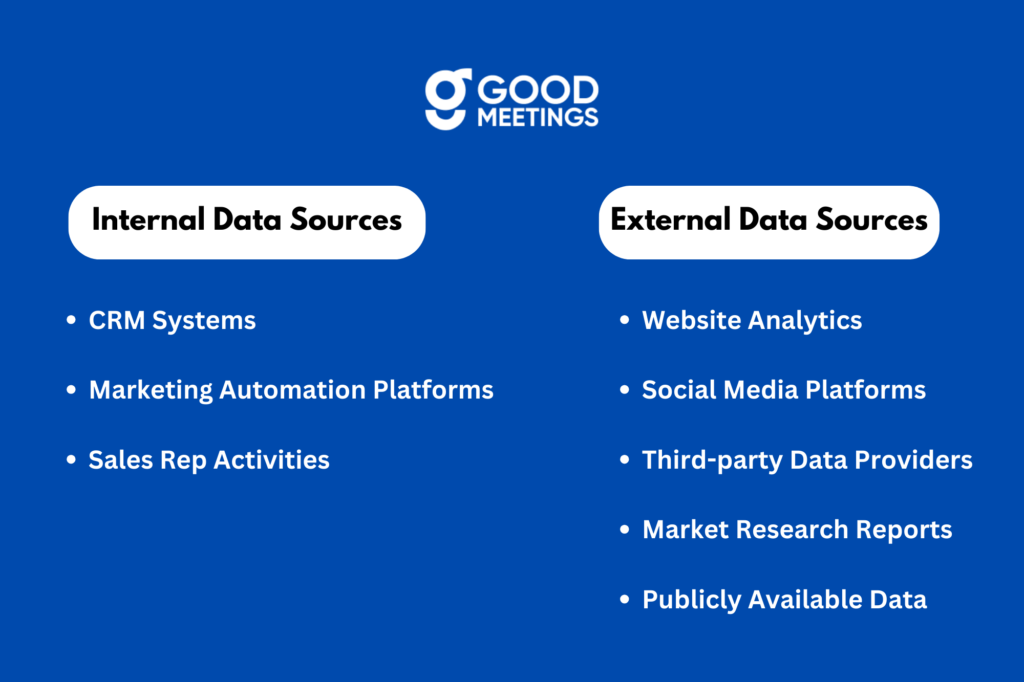
Source: Goodmeetings
Internal Data Sources
- CRM Systems: Customer Relationship Management (CRM) systems are a primary source of sales data, containing information about leads, contacts, accounts, opportunities, and interactions.
- Marketing Automation Platforms: Marketing automation tools track customer engagement, email interactions, website visits, and other marketing activities.
- Sales Rep Activities: Data collected from sales representatives’ activities, such as emails, calls, meetings, and notes, offer insights into customer interactions and sales progress.
External Data Sources
- Website Analytics: Tools like Google Analytics or Adobe Analytics capture data about website visitors, including traffic sources, page views, bounce rates, and conversion rates.
- Social Media Platforms: Social media platforms offer insights into customer demographics, interests, and behaviors, as well as interactions with your brand, allowing for targeted marketing.
- Third-party Data Providers: Additional data such as firmographics, technographics, or intent data acquired from external providers.
- Market Research Reports: Information about industry trends, market size, competitive landscape, and customer preferences sourced from external market research reports.
- Publicly Available Data: Data from sources like government databases, industry publications, or news articles providing insights into economic trends, regulatory changes, or competitor activities.
Related: AI in Sales Forecasting: Uses, Benefits & Best Practices
Role of AI in Sales Intelligence
Did you know? Sales reps spend about 13.4 hours every week doing research by hand.
This process is not only time-consuming but also prone to error. But thanks to AI-powered sales intelligence solutions, you can automate this process and make it faster, more accurate and more efficient.
Artificial Intelligence (AI) plays a key role in sales intelligence by:
- Automating processes
- Analyzing vast amounts of data
- Providing actionable insights
Through AI-powered algorithms and tools, sales teams can:
- Automate Tasks: AI automates repetitive tasks such as data entry, lead scoring, and scheduling, freeing up sales professionals to focus on high-value activities.
- Predictive Analytics: AI algorithms analyze historical sales data, customer interactions, and market trends to predict future sales opportunities and customer behavior.
- Personalized Recommendations: AI-powered recommendation engines analyze customer data to provide personalized product recommendations.
- Sales Forecasting: AI models forecast sales performance based on historical data, market trends, and other factors, helping sales teams set realistic targets and identify potential risks and opportunities.
- Natural Language Processing (NLP): AI-powered NLP tools analyze customer interactions, such as emails, chats, and calls, to extract valuable insights, detect sentiment, and identify customer needs.
- Chatbots and Virtual Assistants: AI-driven chatbots and virtual assistants engage with customers in real time, answering questions, providing information, and guiding them through the sales process.
Related: The Future of Sales: Will AI Replace Salespeople?
Best Sales Intelligence Software
Here’s an interesting fact: In 2020, the global sales intelligence market reached $2.78 billion.
And guess what? By 2030, experts predict it will skyrocket to $7.35 billion, growing at an average annual rate of 10.6%.
This clearly shows that more and more businesses are realizing the importance of sales intelligence solutions. If you’re considering using sales intelligence solutions for your business, we’ve got you covered.
Check out our list of the top 5 best sales intelligence software options in the market. Compare their key features and prices to find the perfect fit for your business needs.
1. Goodmeetings

Source: Goodmeetings
Goodmeetings is a smart sales intelligence tool that uses AI to help your team sell better. It automates tasks and gives you insights from calls, like recording and transcribing them. It works with popular CRMs like Salesforce and HubSpot.
Plus, it offers real-time help and coaching to make sales interactions better. With its easy dashboard, you can track how well your clients, competitors, and sales team are doing. It’s an easy way to collect and analyze sales data to make better decisions for sales growth.
Key Features
- Record meetings and obtain accurate transcripts
- Analyze call data and receive concise summaries
- Create customized dashboards for tracking specific metrics
- Gain insights into client and competitor performance
- Track sales rep performance metrics
- Evaluate customer sentiment
- Access comprehensive customer profiles
- Capture responses to discovery questions for lead scoring
- Support multiple languages
- Easily search and filter meeting data, and extract important topics
- Store meetings in a centralized database and create clips for sharing
- Access instant assistance during meetings and receive real-time guidance
- Add comments for collaboration
- Receive AI-based behavior alerts and AI-powered sales battlecards
- Track meeting metrics like talk-to-listen ratio, word speech and more
- Integrate with popular CRMs
Pricing
- Professional: $50 per month (billed annually)
- Business: $75 per month (billed annually)
You can also try Goodmeetings for free with a 7-day free trial offer. The best part? You can easily sign up for free without any card details.
If you want to see how the tool works, you can also schedule a free demo.
GET IN TOUCH
Unlock Sales Intelligence Insights with Goodmeetings!
2. LinkedIn Sales Navigator
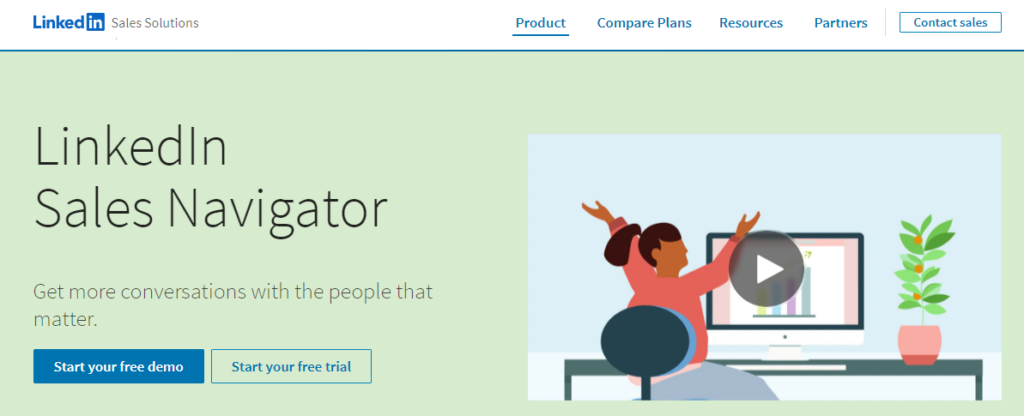
Source: LinkedIn Sales Navigator
LinkedIn Sales Navigator is a favored tool among sales professionals. Taking advantage of LinkedIn’s vast database of businesses and individuals, Sales Navigator excels in lead discovery and management. You can fine-tune your searches by industry, company size, location, job title, and more. However, for advanced features, you need the paid plan.
Key Features
- Advanced account search functionality
- Access to valuable prospect details like – connections and buying signals
- Buyer intent capabilities for targeted outreach
- Offers sales notifications
Pricing
- Available upon request
Related: Gong Alternatives: Gong Competitors You Must Consider in 2024
3. Zoominfo
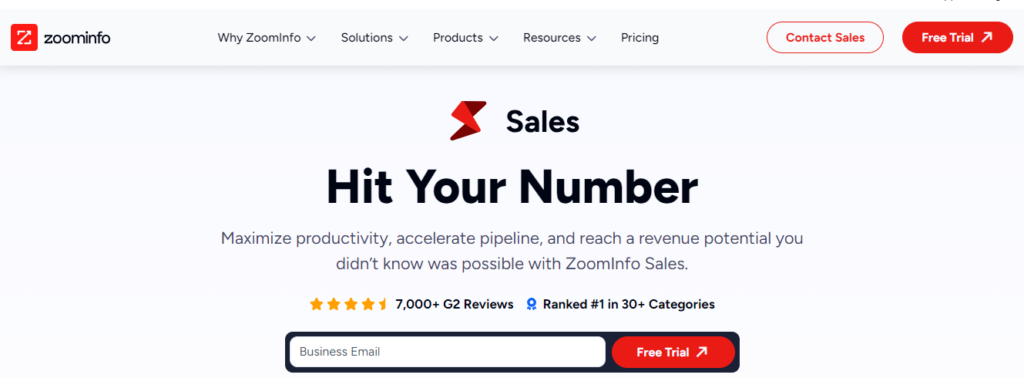
Source: Zoominfo
ZoomInfo is a powerful B2B sales intelligence platform that provides verified contact and account details to support lead-generation efforts. With ZoomInfo, sales teams can accelerate lead generation and enhance sales and marketing automation. You can also use this tool to create ideal customer profiles (ICPs) and match them with potential clients from its extensive database.
Key Features
- Vast database to search for contacts and companies
- Access data on buyer signals and intent
- Evaluate customer interactions across calls, emails, and meetings
- Streamline sales processes with automation features
Pricing
- Available upon request
Related: AI Sales Cold Calling – Benefits, Use Cases, Tools and Best Practices
4. Cognism
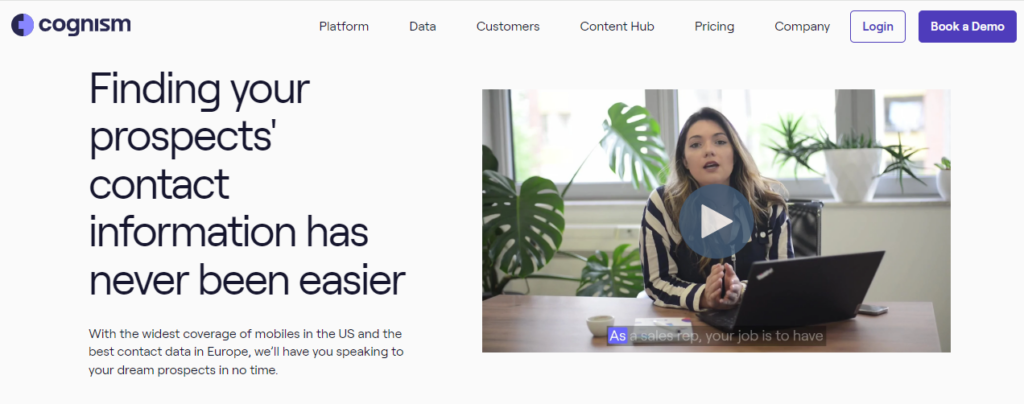
Source: Cognism
Cognism is a leading sales intelligence tool that stands out for its outreach capabilities, offering multiple channels like phone calls and emails to connect with prospects. The best thing about this tool is that it offers integration with various customer relationship management (CRM) systems.
Key Features
- Access an on-demand phone-verified mobile dataset
- Engage prospects through multi-channel outreach
- Integrate with a wide range of CRM systems
- Ensure compliance with GDPR and CCPA regulations
Pricing
- Available upon request
Related: What is Sales Acceleration? – Tools and Tactics Included
5. Datanyze
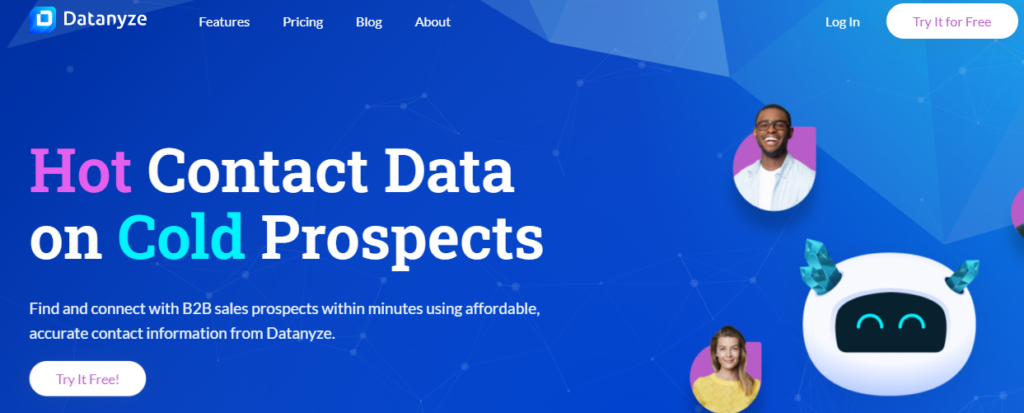
Source: Datanyze
Datanyze is another free sales intelligence software designed to enhance outreach effectiveness by providing contact details of prospects. It also includes tools for lead generation and analytics, empowering businesses to refine their sales and marketing strategies.
Key Features
- Obtain accurate B2B contact details
- Access contact information from LinkedIn profiles
- Save profiles directly from Google Chrome
Pricing
- Nyze Lite: Free
- Nyze Pro 1: $21 per month (billed annually)
- Nyze Pro 2: $39 per month (billed annually)
Related: Sales Analytics 101: Definition, Tools and Metrics
Sales Intelligence Best Practices
Now that you understand sales intelligence and you’ve picked out a few tools to try, here are some simple tips to get the most out of your sales intelligence efforts.
1. Define Clear Objectives
Make sure everyone on your team knows exactly what you’re trying to achieve with your sales efforts. For example, are you aiming to increase sales by a certain percentage or reach a specific target market? Setting clear goals helps keep everyone focused and working towards the same outcome.
2. Use Quality Data
It’s important to gather information that is accurate, up-to-date, and relevant to your business. This means collecting data from reliable sources and making sure it’s not outdated or incorrect.
3. Invest in the Right Technology
Choose sales intelligence solutions that suit your business needs and goals. Investing in the right technology can save time and effort for your team, allowing them to focus on more important tasks like building relationships with customers.
4. Train Your Sales Team
Provide thorough training for your sales team on how to use sales intelligence solutions effectively. Make sure they understand how to interpret data and use it to improve their sales performance.
Related: How to Use AI For Sales Training – Tools and Best Practices
5. Monitor and Measure Results
Keep track of how your sales intelligence initiatives are performing and regularly review your progress against your goals. Monitoring and measuring results helps you identify what’s working well and what areas need improvement.
6. Stay Updated
Stay informed about industry trends, market conditions, and competitor activities. This allows you to adapt your sales strategies accordingly and stay ahead of the competition.
Use Artificial Intelligence to Improve Sales Rep Productivity
Using sales intelligence software is just half the work done; the other half is performed by the sales reps.
Sales intelligence provides them with crucial sales data, and the sales reps use this data to make important decisions that lead to success.
Sales Intelligence Tools + Sales Team Performance = Sales Success
So, along with using the right sales intelligence tool, you also need to improve the performance of your sales team. And guess what? AI can help you with that.
With AI tools, you can not only automate mundane tasks to free up your sales team’s time but also provide coaching and training to boost their productivity.
Related: Complete Guide to Sales Battlecards – What Are They and How to Use Them?
One tool that can help you with all this is Goodmeetings.
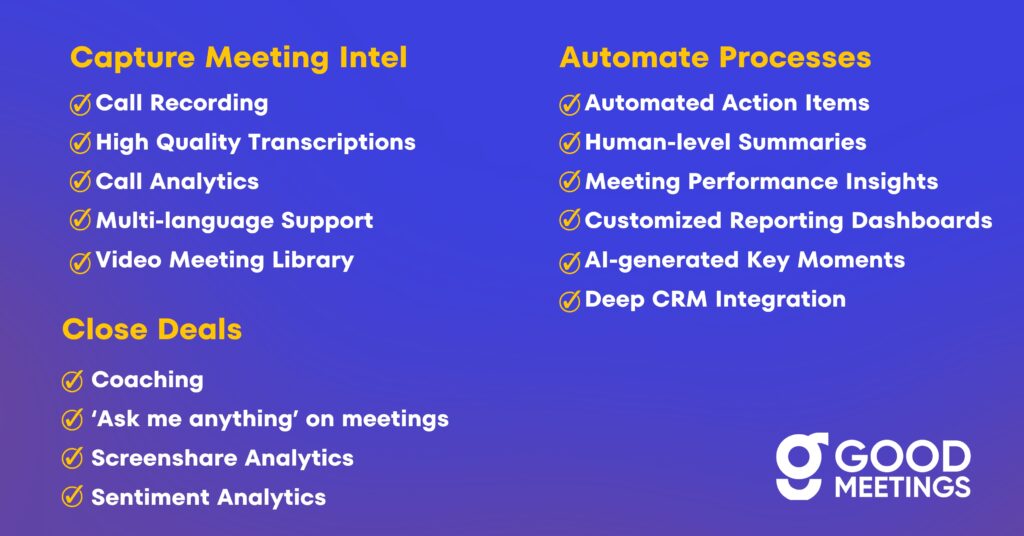
Here’s how Goodmeetings can help improve your sales reps’s performance:
- Efficient Meeting Management: Goodmeetings enables easy meeting recording, capturing every detail, ensuring no valuable information is missed.
- Automated Data Entry and Note-Taking: Goodmeetings seamlessly integrates with CRMs, automating mundane tasks like data entry and note-taking.
- Comprehensive Customer Insights: With detailed customer profiles, including past interactions, designations, and preferences, sales reps gain a holistic understanding of their clients, fostering better engagement.
- Automated Questionnaires: The platform automatically collects responses to custom discovery questions, facilitating lead qualification and scoring, saving time and effort.
- Key Moment Highlights: Goodmeetings identifies and highlights crucial moments in customer conversations, aiding reps in providing personalized service and addressing customer needs effectively.
- AI-Based Coaching: Through AI-based nudges and battlecards, new reps receive real-time guidance, ensuring adherence to best practices and boosting their confidence during interactions.
- Live Human Coaching: Sales reps can access real-time support from experienced leaders via private chat, enabling them to navigate challenging conversations with ease and professionalism.
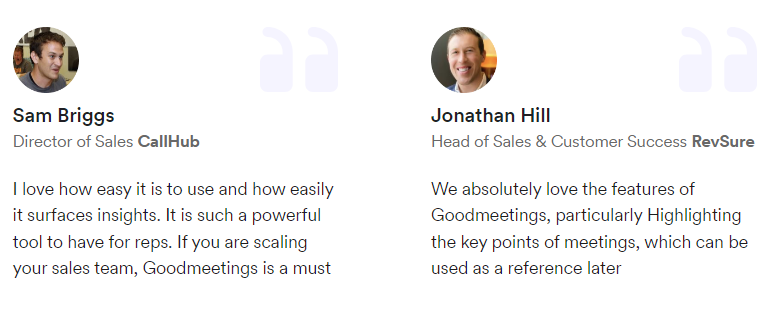
Source: Goodmeetings
Goodmeetings is trusted by leading revenue teams worldwide. It provides a comprehensive suite of tools, including sales intelligence, conversational insights, meeting analytics, and AI-driven sales training. It’s your all-in-one solution to boost sales productivity.
GET IN TOUCH

